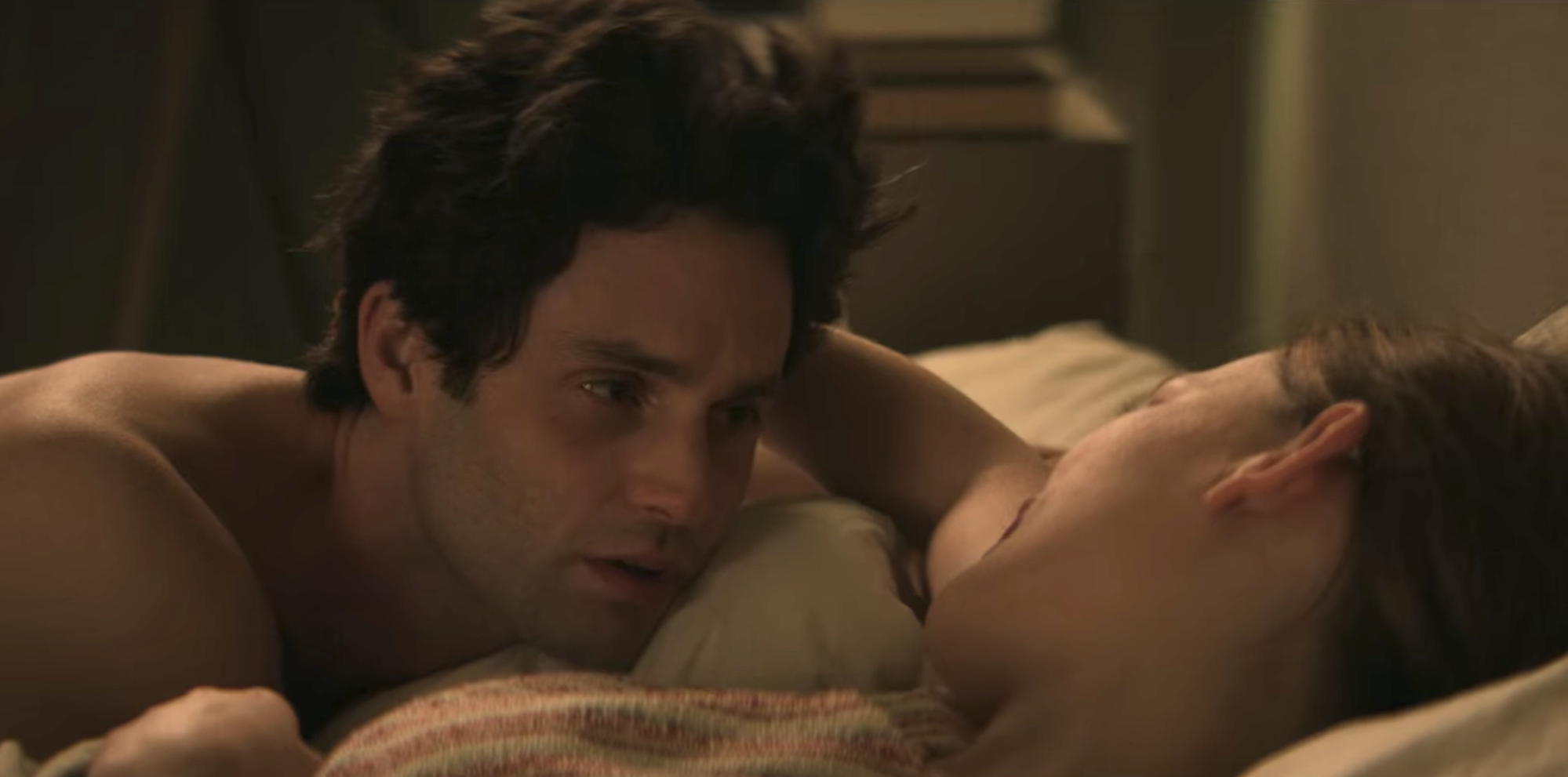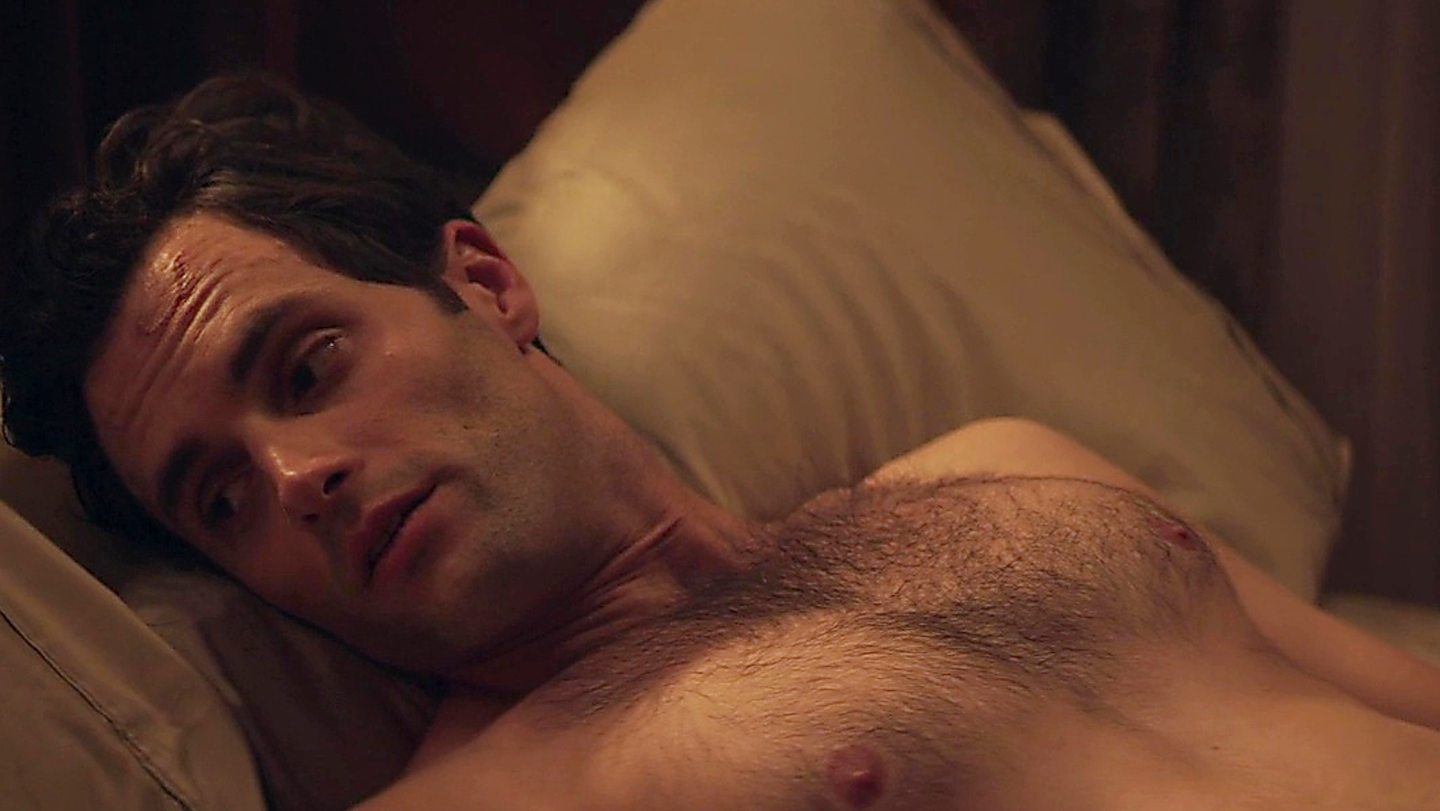Season four of You, the Netflix drama about charming serial killer and weaponised Nice Guy Joe Goldberg, is making a splash. That isn’t just because of the show’s return, which sees Joe trying to live a quiet life under the guise of Professor Jonathan Moore in an English university, but because of the comments that leading man Penn Badgley has made about sex scenes — or more accurately, the absence of them — on his podcast. This has reopened a door towards one of the pastimes that’s most likely to get social media users foaming at the mouth: the dreaded Sex Scene Discourse. Popular amongst the Terminally Online, the kind of thing debated on Reddit, spilling onto Film Twitter periodically, discussions around sex scenes and their absence have been around for a while. But with Penn wading into this discourse, the same question is causing social media to clutch at its pearls once again: are sex scenes really necessary?
In his podcast, Penn stresses a desire to move away from what describes as “intimate” scenes, saying that “fidelity in every relationship, and especially my marriage is important” to him. The actor goes on to say that the prevalent nature of sex scenes in You, and the consideration that gives for fidelity is “one of the reasons [he] initially wanted to turn the role down.” While it’s nobody’s place to judge what an actor is or isn’t comfortable with, the emphasis placed on “fidelity” in this latest remix of Sex Scene Discourse carries with an air of conservative moralising, already being deployed on Twitter as a way of treating sex on screen as something perverse or offensive.
When responding to this kind of knee-jerk move away from sex scenes, the temptation is to simply say that, if viewers don’t like their media to have sex scenes, they should watch something else. But this desire to airbrush out sex scenes from what you engage with can often ignore the ways in which sex on screen can be an important way of exploring themes.

It’s mainstream movies — and as a result, mainstream audiences — that are increasingly sexless. At the core of this, the sun around which all mainstream films seem to orbit, is the Marvel Cinematic Universe: an ever-expanding series of superhero films, TV shows, and spinoffs, which are infamously clinical and devoid of intimacy. Even MCU films that require some degree of chemistry between actors — look at the relationship between Peter and MJ in the Spider-Man series, or the clunky attempts at flirtation between Bruce Banner and Natasha Romanoff in Age of Ultron — approach the idea of these characters actually desiring each other as if its some taboo, too icky for mainstream audiences. The result is a series of connections that are growing increasingly chaste.
“Sex Scene Discourse oversimplifies the point of showing bodies and desire on screen.”
And that’s the real problem here: the relationship between an increasingly sexless cinema, and audiences that are increasingly able to curate what they watch in a way that will never make them feel uncomfortable, means that audiences are — whether they know it or not — becoming more conservative in a way that has an dark historical context.
One of the defining qualities of Hollywood film in the 20th century was the impact of the Hays Code, the name given to the Motion Picture Production Code after its main architect, Will H. Hays. The code was the guiding light that all films needed to adhere to in order to secure distribution from 1934 (when the code began to be rigidly enforced) to 1954. The key factor of the code was its conservative political principles: no nudity was allowed (even in silhouette); the clergy couldn’t be mocked (a shield not given to other religions), and miscegenation — a mixed-race relationship — was strictly forbidden. The latter point led to actors of colour historically losing out on roles.
While it might seem like a leap to say that Sex Scene Discourse is an immediate pipeline to regressing to a Hays Code-style Hollywood, there is something to think about when it comes to just how conservative even contemporary audiences are becoming.
Sex Scene Discourse oversimplifies the point of showing bodies and desire on screen. So often people complain that sex scenes don’t advance the plot. This obsession with plot feels like another knock-on effect of the MCU-ification of cinema; that the sole purpose of anything on screen is to drive events forward. But this ignores so many of the other things that make films interesting: themes and ideas; the interior lives of characters. All of the things that are messier and more complicated than plot, and this oversimplification of cinema carries with it a worryingly conservative oversimplification of the rest of the world.
SUBSCRIBE TO I-D NEWSFLASH. A WEEKLY NEWSLETTER DELIVERED TO YOUR INBOX ON FRIDAYS.
To try and hand-wave sex out of cinema is to hugely constrain the number of stories that are able to be shown on screen; it seems more vital now to stress the fact that stories about desire, bodies, and sex matter (they just matter). There’s something actually liberating about queer desire explored on its own terms by queer filmmakers; films like Weekend or Stranger by the Lake are fascinating explorations of all the messiness and danger of sex and relationships. These acts of storytelling feel more vital than ever.
But more than just that, the worrying thing about our endless return to Sex Scene Discourse is that it seems the reaction against sex on screen is becoming more reactionary and severe. There’s no reason to believe that Hollywood would ever adopt something like the Hays Code again, but the idea of dangerously conservative ideas being dressed up in progressive clothing about the safety of the audience is something that could be a grave mistake to ignore.


